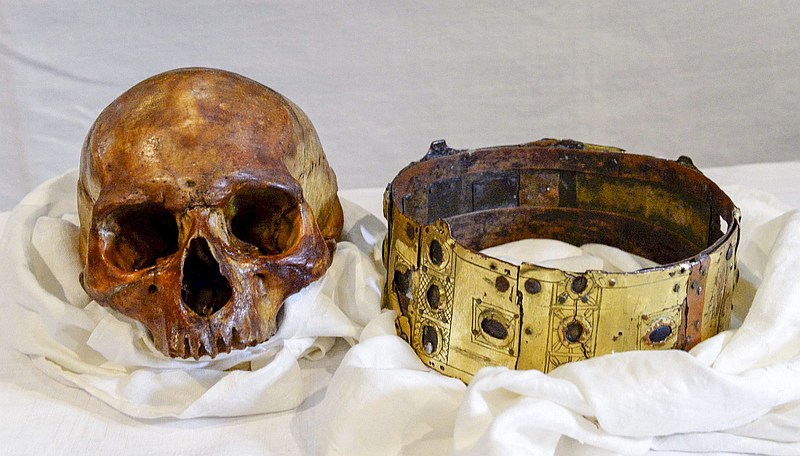
St. Eric was descended from a most illustrious Swedish family; in his youth he laid a solid foundation of virtue and learning, and married Princess Christina of Denmark, granddaughter of Inge I, King of Sweden. Upon the death of King Sverker I on Christmas Day, 1156 (murdered by his own coachman as he was going to Christmas Mass), Eric was, purely for his extraordinary virtues and qualifications, placed on the throne by the election of the states, according to the ancient laws of the Kingdom of Sweden. His first care in that exalted and dangerous state was to watch over his own soul. He treated his body with great severity, fasting and watching much, in order to keep his domestic enemy in due subjection to the spirit, and to fit himself for the holy exercises of heavenly contemplation and prayer, which were his chief delight.
He was truly the father and the servant of all his people. With indefatigable application he himself administered to them justice, especially to the poor, to whose complaints his ears were always open, and whose grievances and oppressions he took care himself to redress. He often visited in person the poor who were sick, and relieved them with bountiful alms. Content with his own patrimony, he levied no taxes. He built churches, and by wholesome laws restrained the brutish and savage vices of his subjects.
The frequent incursions of the idolatrous Finns upon his territories obliged him to take the field against them. He vanquished them in a great battle; but after his victory he wept bitterly at the sight of the dead bodies of his enemies which covered the field, because they had died unbaptized. When he had subdued Finland, he sent St. Henry, Bishop of Uppsal, to preach the Faith of Christ to that savage infidel nation, of which he may be styled the Apostle.

Among the subjects of this good King were certain sons of Belial, who made his piety the subject of their ridicule, being mostly obstinate idolaters. Magnus – son of a Danish lord but related to Swedish royalty by his mother – blinded by ambitious views to the crown of Sweden, put himself at the head of these impious malcontents, and engaged them in a conspiracy to take away the life of their sovereign. (It is widely believed that this Magnus was behind the assassination of King Sverker mentioned above. After St. Eric's death, he reigned as Magnus II, but was generally considered a usurper. Magnus was killed in battle against Karl, the son of the murdered King Sverker, in 1061, after a reign of only a year. His violent death was considered divine vengeance for his having murdered two legitimate and pious kings.)
The holy King Eric was hearing Mass on the day after the Feast of the Ascension, when news was brought to him that the
rebels were in arms and on the march against him (image above). He calmly answered: Let us finish the Holy Sacrifice; the
remainder of the Festival I shall keep elsewhere.
After Mass he recommended his soul to God, made the Sign of the Cross, and,
to spare the blood of the citizens who were ready to defend his life at the expense of their own, he marched out alone before his guards.
The conspirators rushed upon him, beat him down from his horse, and struck off his head with a thousand indignities in derision
of his religion. His martyrdom happened on the 18th of May, 1160.
God honored his tomb with many miracles, and it remained at Uppsala undefaced even after the Protestant revolution in the 16th century. Before that, St. Eric was honored as the chief Patron Saint of Sweden. He had ordered the ancient laws and constitutions of the Kingdom to be collected in one volume, which bears the title of King Eric's Law or the Code of Uppland – highly respected in Sweden. It was confirmed in the 13th century by the learned King Magnus III.

All power and authority among men is derived from God, as Christ declared to Pilate (John 19), and as the Book
of Wisdom often repeats. Whence St. Paul teaches us that he who resisteth the power, resisteth the ordinance of God.
(Rom. 13, 2). On no man does He confer the least degree of jurisdiction without the most severe injunction and obligation
that he employ it according to His will, and in the first place for the advancement of His divine honor. Hence every father or
head of a family, magistrate or king, is accountable to God for those under his charge, and will be condemned as a traitor on the
last day, if he does not employ all the means in his power that God may be known, praised, and faithfully served by them. This is
the primary obligation of those whom God has vested with authority. In the faithful discharge of this trust, the glorious St. Eric
laid down his life.
NEW: Alphabetical Index
Contact us: smr@salvemariaregina.info
Visit also: www.marienfried.com